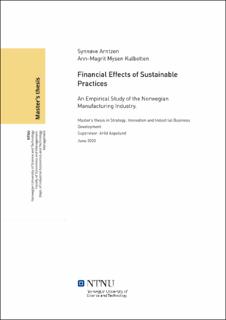| dc.contributor.advisor | Aspelund, Arild | |
| dc.contributor.author | Arntzen, Synnøve | |
| dc.contributor.author | Kulbotten, Ann-Magrit Mysen | |
| dc.date.accessioned | 2021-09-14T17:08:48Z | |
| dc.date.available | 2021-09-14T17:08:48Z | |
| dc.date.issued | 2020 | |
| dc.identifier | no.ntnu:inspera:58063911:58067782 | |
| dc.identifier.uri | https://hdl.handle.net/11250/2776983 | |
| dc.description.abstract | Det økende fokuset på at selskaper må ta ansvar for sine handlinger, har resultert i økt implementering av bærekraftige løsninger hos selskapene, som et middel til å begrense deres negative påvirkning på samfunnet. Ved å presentere de finansielle fordelene av å implementere bærekraftige løsninger, kan selskaper motiveres til å håndtere de miljømessige og sosiale utfordringene i samfunnet.
Ettersom implementering av bærekraftige løsninger kan ha stor innvirkning på selskapenes økonomiske resultater, er det viktig å undersøke om bærekraftige strategier har innvirkning på miljømessige og sosiale tiltak, og de økonomiske effektene av å implementere disse miljømessige og sosiale tiltak.
Studiet er basert på en SEM (structural equation modeling) analyse utført i SPSS Amos. SEM analysen er basert på kvantitative data samlet gjennom et tverrsnitts- og selvrapportert spørreskjema kalt SISVI (Sustainable Innovation and Shared Value Creation), distribuert av NTNU. Undersøkelsen ble utdelt til selskaper som arbeider innen norsk industri, og dataen brukt i analysen er basert på besvarelser fra 464 selskaper. I tillegg komplementeres dataen som brukes i SEM-modellen med objektive økonomiske data fra Proff Forvalt. Modellen utforsker de økonomiske effektene av miljømessige og sosiale tiltak, hvor både de subjektive og objektive økonomiske resultatene måles gjennom tre økonomiske parametere; verdiskapning, kostnadsreduksjon og risikoreduksjon.
Resultatene som ble funnet gjennom SEM-analysen, viser at bærekraftige strategier har en positiv assosiasjon med miljømessige og sosiale tiltak, noe som betyr at selskapers bærekraftige aktiviteter er i samsvar med deres bærekraftige strategier. Resultatene avdekket videre at det er positive økonomiske effekter av miljøtiltak, men bare i tilfellet hvor de økonomiske effektene måles subjektivt. Resultatene viser videre at det ikke er statistisk signifikante finansielle effekter av sosiale tiltak.
Funnene viser at norske industri selskaper implementerer bærekraftige tiltak i tråd med sine strategier, samt at de økonomiske effektene av å implementere bærekraftig tiltak kan variere avhengig av hvordan de økonomiske resultatene blir målt. De varierende resultatene oppfordrer til videre forskning og utvikling av et rammeverk for hvordan finansielle effekter av bærekraftige løsninger skal måles. Resultatene viser at bærekraft kan være en kilde til økt økonomisk resultat, og har følgelig konsekvenser for selskaper så vel som markedsaktører. | |
| dc.description.abstract | The rising pressure towards corporations to take responsibility for their actions, has resulted in an increased implementation of sustainable practices, as a means to limit firms' negative impact on society. Presenting the financial benefits of implementing sustainable practices, can be a motivational factor for corporations to manage the environmental and social challenges in society.
As the implementation of sustainable practices can have major impact on companies' financial performance, it is important to research the influence of sustainable strategies on sustainable initiatives, as well as the financial effects of the environmental and social initiatives.
The thesis is based on a structural equation modeling (SEM) analysis conducted in SPSS Amos. The SEM analysis is based on quantitative data collected through the cross-sectional self-reported SISVI (Sustainable Innovation and Shared Value Creation) survey distributed by NTNU. The survey was distributed within the Norwegian manufacturing industry, and the data applied in the model is based on responses from 464 corporations. In addition, the data applied in the SEM model, is complemented with objective financial data from Proff Forvalt. The model thereby explores the effects of environmental and social initiatives on both perceived and objective financial performance. The perceived and objective financial performance are measured in terms of three financial parameters; value creation, cost reduction and risk reduction.
The results provided through the SEM analysis show that there is a positive influence of sustainable strategies on both environmental and social initiatives, meaning that the corporation's sustainable activities are aligned with their sustainable strategies. The results also revealed that there exists positive financial effects of environmental initiatives, but only when measuring perceived financial performance. Furthermore, the results are statistically insignificant when measuring the effects of social initiatives on both perceived and objective financial performance.
The results show that Norwegian companies implement sustainable initiatives according to their sustainable strategies, and that the financial effects of sustainable initiatives vary depending on how financial performance is measured. The varying results call for further research and development of a framework, on how to measure financial effects of sustainable practices. Conclusively, sustainable practices can be a source to improved financial performance, hence the results have implications for corporations, as well as for market participants. | |
| dc.language | | |
| dc.publisher | NTNU | |
| dc.title | Financial Effects of Sustainable Practices | |
| dc.type | Master thesis | |
